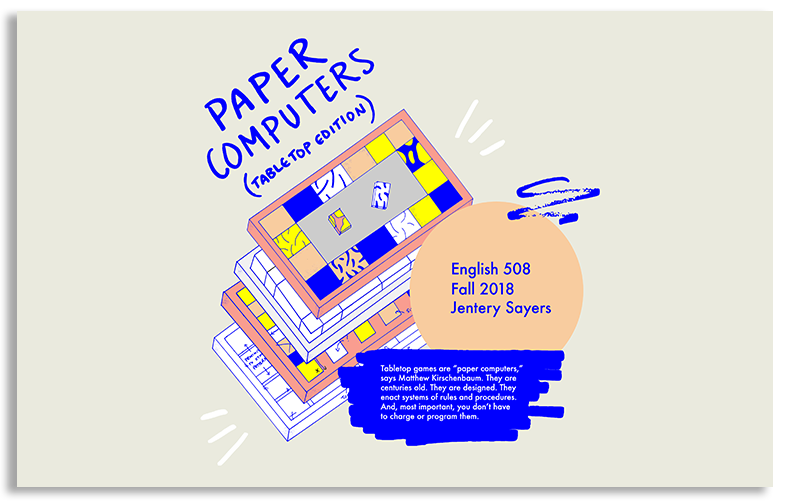Paper Computers
“Paper Computers” was a grad seminar (Fall 2018) about developing procedural literacy through tabletop game design. Students prototyped their own games and game manuals.
I borrowed the term, “paper computers,” from Matthew Kirschenbaum to foreground not only low-tech prototyping but also histories of paper as a medium for storage, processing, and play. We dedicated most of our seminar time to speculative design, asking “what if?” and experimenting with games as procedural systems. We attended to the past in the process by drawing upon materials—from books and games to zines and experimental media—available in UVic Special Collections. I also invited people from the worlds of design and criticism to join us as guest speakers. Hearing from these speakers and talking with them was a highlight of the course.
The official description of “Paper Computers” is below, together with links to the course website, my notes, and other related resources. The notes include keywords in games and design as well as suggestions for prototyping and a list of relevant games and readings. I also wrote a reflection (titled, “Tabletop Inquiry”) on the course, produced a handout for local high school students, and gave a talk at UVic in 2019 on the pedagogy of “Paper Computers.” The slides for that talk include photographs of some games prototyped by students in the seminar.
Thanks to everyone who participated in “Paper Computers” for an absolutely wonderful course and to Avery Alder, Nina Belojevic, Whitney “Strix” Beltrán, Anne Burdick, Emily Care Boss, Alexander Galloway, Amy Hildreth Chen, Isaac Childres, Derek Hansen, Matthew Kirschenbaum, Kari Kraus, Michael Lines, Shaun Macpherson, Renee M. Shelby, Nikki Valens, and Lara Wilson for joining us as guest speakers and contributors.

Paper Computers: Tabletop Edition
Fall 2018 | UVic English 508 | Grad seminar for 12 students
Links: course website (HTML); syllabus (PDF); reflection (HTML); notes (HTML); handout for high school students (PDF); poster (PNG; by Danielle Morgan and me); talk at UVic with slides (HTML)
About the Seminar
Tabletop games are “paper computers,” says Matthew Kirschenbaum. They are centuries old. They are designed. They enact systems of rules and procedures. And, most important, you don’t have to charge or program them.
This seminar follows that low-tech disposition. We’ll survey the history of paper computers and their entanglements with literature. Then you’ll select a cultural movement or -ism (between 1870 and 1970) and use it to prototype your own tabletop game. We’ll discuss the material dynamics that bridge aesthetics with mechanics, including how games routinely rehearse legacies of colonialism and capital accumulation. What alternatives exist, and how are they made? We’ll play some games as we go, and read a smidgen of media theory and fiction, too. From week to week, we’ll ground it all in design practices, such as bookmaking, 3D modelling, fabricating, and playtesting. Various guest speakers will join us. By the end, you should develop a palpable sense of how this becomes that with a computer, but without running culture in the background.
Coding: none. Educational games: none. Meeples: likely.
Aims of the Seminar
For you to:
- Examine the entanglements of game studies with literary studies through A-D-M and M-D-A frameworks that foreground the material dynamics (“D”) between aesthetics (“A”) and mechanics (“M”).
- Understand digital studies as a centuries-old design practice and approach it through “low-tech” techniques anchored in gaming, prototyping, and playtesting.
- Learn how speculative design and game prototyping apply to digital project development, with particular attention to labour, conjecture, and negotiation.
- Prototype an offline tabletop game informed by the politics and aesthetics of an -ism and document the prototyping process.
- Share and test your tabletop game with people in and beyond this seminar.
- Communicate (via a presentation and in writing) the relevance of your game prototype to literary and digital studies.
For more information, visit the course website.
Poster and featured image by Danielle Morgan. Used with permission. I created this page on 19 June 2019 and last updated it on 24 June 2024.